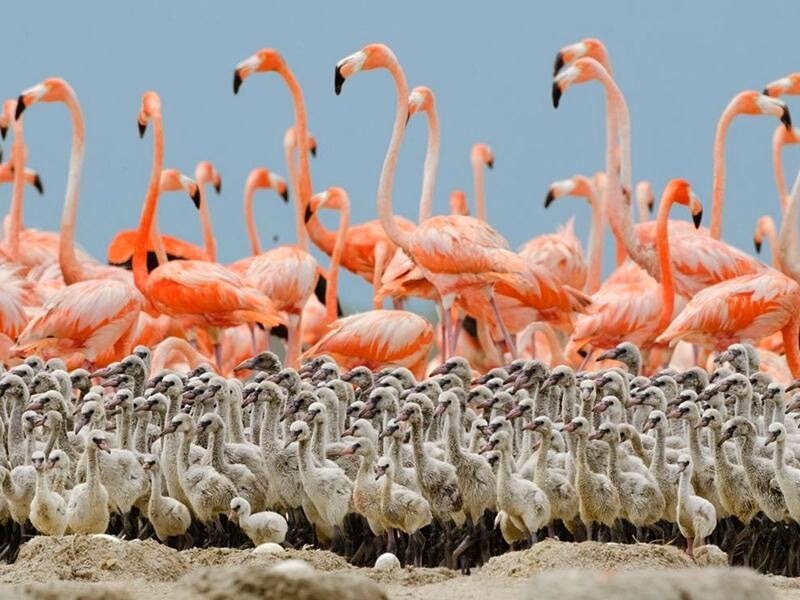Bakhtegan wetland shrinking, flamingo chicks in danger

TEHRAN – Flamingo chicks being born in shallow waters of Bakhtegan wetland in Fars province are threatened to death due to the drying up wetland; while only the Ministry of Energy can help them survive granting Bakhtegan water right, IRNA reported on Sunday.
Bakhtegan Lake is a salt lake with a surface area of 3,500 square kilometers it was once Iran's second-largest lake. It was fed by the Kor River. Several dams on the river had significantly reduced water flow into the lake, increasing its salinity and endangering the lake's populations of flamingos and other migratory birds.
With heavy rainfall raising Bakhtegan wetland level by 30 percent, flocks of flamingos migrated to the wetland nesting and laying eggs, however, temperature raise along with high evaporation resulted in drainage of the wetland which put the life of many flamingo hatchlings at risk.
Based on the latest data published by National Drought Warning and Monitoring Center affiliated to Iran’s Meteorological Organization, since the current crop year (September 23, 2018), Fars province recorded 367 millimeters of rainfall compared to 132.9 millimeters in the previous water year, demonstrating a 176.2 percent rise. The amount also raised in comparison to the long-term average of 296.5 mm, amounting to 23.8 percent.
This is while, the Department of Environment has determined the wetland water right, and announced to the Ministry of Energy, which so far has not taken even a single step to provide its water right.
Water right of Bakhtegan and Tashk wetlands have been designated due to their seasonal and climatic conditions, which is about 1.2 billion cubic meters in case of high precipitation and 342 million cubic meters in drought spells and 700 million cubic meters in normal conditions, which must be provided by the Ministry of Energy, the deputy environment chief for the wetlands said.
“We called on the Ministry to provide the water rights preventing the wetlands being dried affected by evaporation, but so far, no water has been released,” Masoud Baqerzadeh lamented.
However, the Ministry has released 120 million cubic meters of water for agricultural sector, he added.
The water rights must be provided before the beginning of summer and rising temperature, otherwise it would not be so efficient, he regretted.
“We are conducting studies to find the best sources and ways of providing the water right. The Department of Environment is pursuing the process to save the flamingo chicks.”
Why wetlands are so important?
Wetlands being inundated by water, either permanently or seasonally, are a distinct ecosystem where oxygen-free processes prevail. Wetlands are of great importance playing a number of functions, including water purification, water storage, processing of carbon and other nutrients, stabilization of shorelines, and support of plants and animals. They are also considered the most biologically diverse of all ecosystems, serving as home to a wide range of plant and animal life.
Wetlands have historically been the victim of large draining efforts for economic development, or flooding for use as recreational lakes or hydropower generation. Some of the world's most important agricultural areas are wetlands that have been converted to farmland. Since the 1970s, more focus has been put on preserving wetlands for their natural function yet by 1993 half the world's wetlands had been drained.
Across Iran, some 250 wetlands have been identified.
FB/MG
Leave a Comment